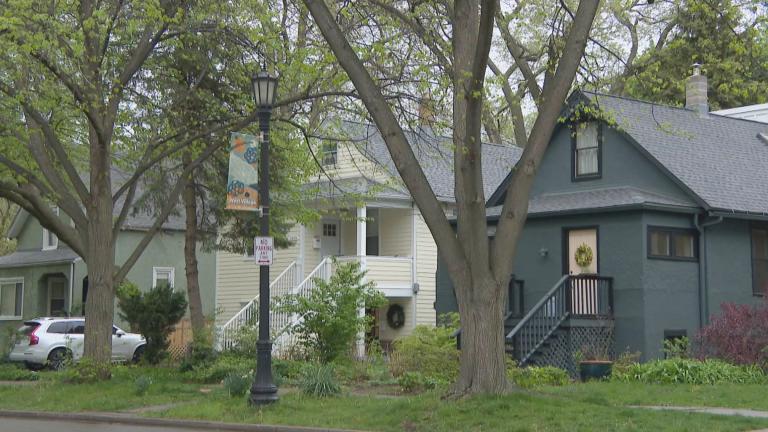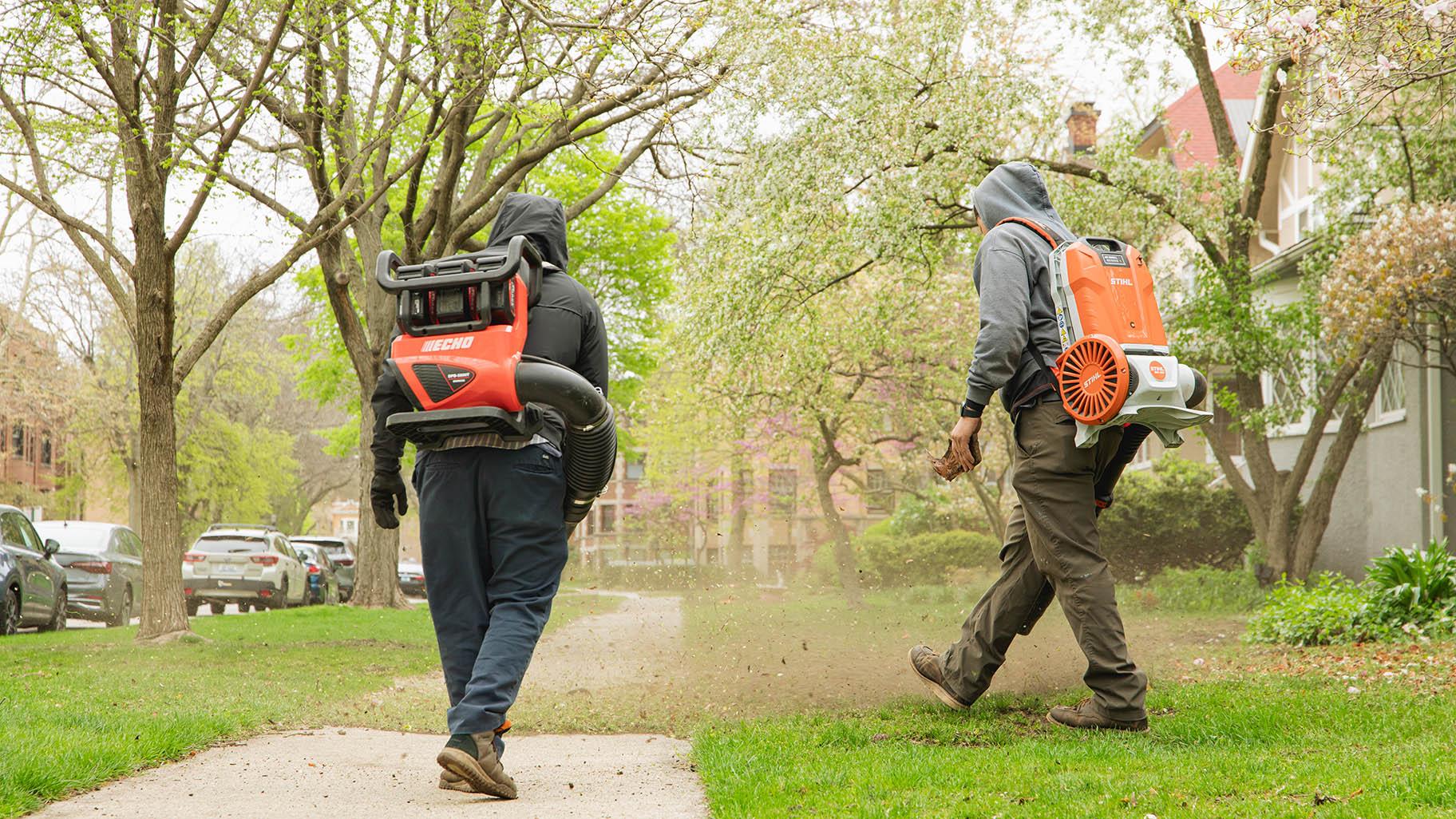 Landscapers from Touch of Life Lawn Care work on an Evanston lawn with electric leaf blowers on April 23, 2024. (Michael Izquierdo / WTTW News)
Landscapers from Touch of Life Lawn Care work on an Evanston lawn with electric leaf blowers on April 23, 2024. (Michael Izquierdo / WTTW News)
Note: This article was updated to add additional context about the timeline of the passage of Evanston’s eventual ban on gas-powered leaf blowers and the votes of the Environmental Board that landscaper Tom Klitzkie recused himself from.
The police showed up twice within an hour.
They didn’t say anything to Juan Mora or his crew, who had just begun their morning landscaping job in Evanston: one worker trimming the edges of his client’s lawn with a weedwacker, the other two cutting grass atop roaring mowers.
Police rolled up and parked outside of the property, left, and came back 10 minutes later to watch the landscaping job for a bit longer, only to leave shortly after, Mora said.
Mora and his crew hadn’t yet begun what could have been the punishable offense: leaf blowing.
“You see, I’m scared,” Mora said.
Since April 1, 2023, the landscaping community in Evanston has been tasked with making a drastic change for climate and noise concerns: switching from gas- or propane-powered leaf blowers to electric.
Mora and his company, Juan Mora Landscaping, ceded to this change and spent around $6,000 for two electric blowers. This sunny April morning was his first time bringing out the new equipment, but already, he wasn’t satisfied with the job: battery life gone too soon and weaker blowing power, drawing out a task he’d have swiftly finished with a gas blower.
He’s been met with hurdles this spring cleanup season.
For one thing, the monetary relief he thought was available to his company is not. While Evanston had earmarked grants for landscapers making the switch to electric, he said those landscapers must have been registered and based in the suburb to qualify. Mora has been working in Evanston for 16 years, but he’s based in Skokie.
Second, Mora said he had to raise his rates to offset the costs of the new equipment as well as the increased time he said it now takes to finish the job. So, his once reliable rounds in Evanston have been decimated. He said he’s gone from 35 accounts in the suburb to just six.
 Landscaper Juan Mora says Evanston’s gas-powered leaf blower ban has made it a financial hardship to continue doing business in the suburb. (Blair Paddock / WTTW News)
Landscaper Juan Mora says Evanston’s gas-powered leaf blower ban has made it a financial hardship to continue doing business in the suburb. (Blair Paddock / WTTW News)
On the sprawling property his crew was tending to that April morning, he once charged $1,200 for the spring cleanup. He raised it to $2,500 after the ban. The owners were able to eat the cost, but he said the majority of his clientele can’t.
Over the loud hum of the blower, Mora lamented that this might be his final year in Evanston.
“I tell my son, maybe change. I don’t know,” Mora said.
Tom Klitzkie, president and co-owner of Nature’s Perspective Landscaping, who runs what he has called the “largest landscaping business in Evanston,” served as a member of the city’s Environmental Board. That board helped advise the Evanston City Council in its ban of gas- and propane-powered leaf blowers after several years of planning around environmental sustainability measures from the city and a local advocacy group as well as movement around bans and restrictions in other area towns.
Klitzkie said he recused himself from votes when they presented a conflict of interest and initially advocated against the ban on behalf of the landscaping industry in Evanston. The ban was first discussed years before the committee began working on it. After the ban was enacted, his company began making preparations for the switch.
Now, Klitzkie is one of the top submitters of leaf blower violation complaints involving other landscaping companies. He’s the second most frequent submitter starting in 2023, accounting for 283 of the whopping 1,385 submissions made to the city as of April 25 of this year. Most of the submitters — 640 — left their name blank. 122 are under “hire reputable landscapers.”
While many have since made the electric transition, landscapers said the ban has still caused them stress: financial woes when making the switch, continued fear of harassment, and the loss of clients over raising prices to offset both the cost of equipment and the extended time it now takes to finish jobs.
Legislation With the Greenest of Intents
In November 2021, Evanston City Council amended its ordinance on leaf blowers to ban the use of gasoline- or propane-powered blowers after April 1, 2023. Previously, gas- or propane-powered blowers were allowed during peak landscaping season: March 30 to May 15 and Oct. 15 to the first Thursday of December.
Landscapers are left using electric leaf blowers, which have no seasonal restrictions.
However, to the confusion of landscapers, the amendment does not apply to city baseball fields or artificial turf fields, in play areas of golf courses, or constructruction projects involving paving, repair or patching public streets.
Evanston Mayor Daniel Biss said the carve-out isn’t for who does the work — it’s for the specific function the blower is being used for. He said he’s been told there’s difficulty in using electric tools for the aforementioned properties.
“But I have to tell you, the city’s got to make the full transition as well,” Biss said.
For being such a contested issue now, in 2021 the ordinance sailed through City Council: It was passed alongside other non-controversial items.
The city’s Environmental Board recommended the proposed changes to city staff, with two issues propelling the ban: disruptive noise from leaf blower use and negative environmental impacts.
The ban falls in line with the city’s Climate Action and Resilience Plan, which included phasing out the use of gasoline- and propane-powered leaf blowers.
These bans make sense to Dr. Susan Buchanan, professor of environmental and occupational health sciences at the University of Illinois Chicago.
“They are an important component of many things we need to do to save our planet,” Buchanan said.
The gas- and propane-powered blowers release raw petroleum product emissions, which have greenhouse gases, as well as emissions that cause health problems, she said.
One hour of operation of a commercial leaf blower emits smog-forming pollution comparable to driving a new light-duty passenger car about the distance from Los Angeles to Denver, according to research from the California Environmental Protection Agency.
Workers using those blowers are exposed to high levels of fossil fuel emissions, Buchanan said. They’re also breathing in much of the particulate matter being blown. That can lead to inflammation of the heart, as well as lung irritation.
“Workers are all being exposed to really high levels of those pollutants,” Buchanan said.
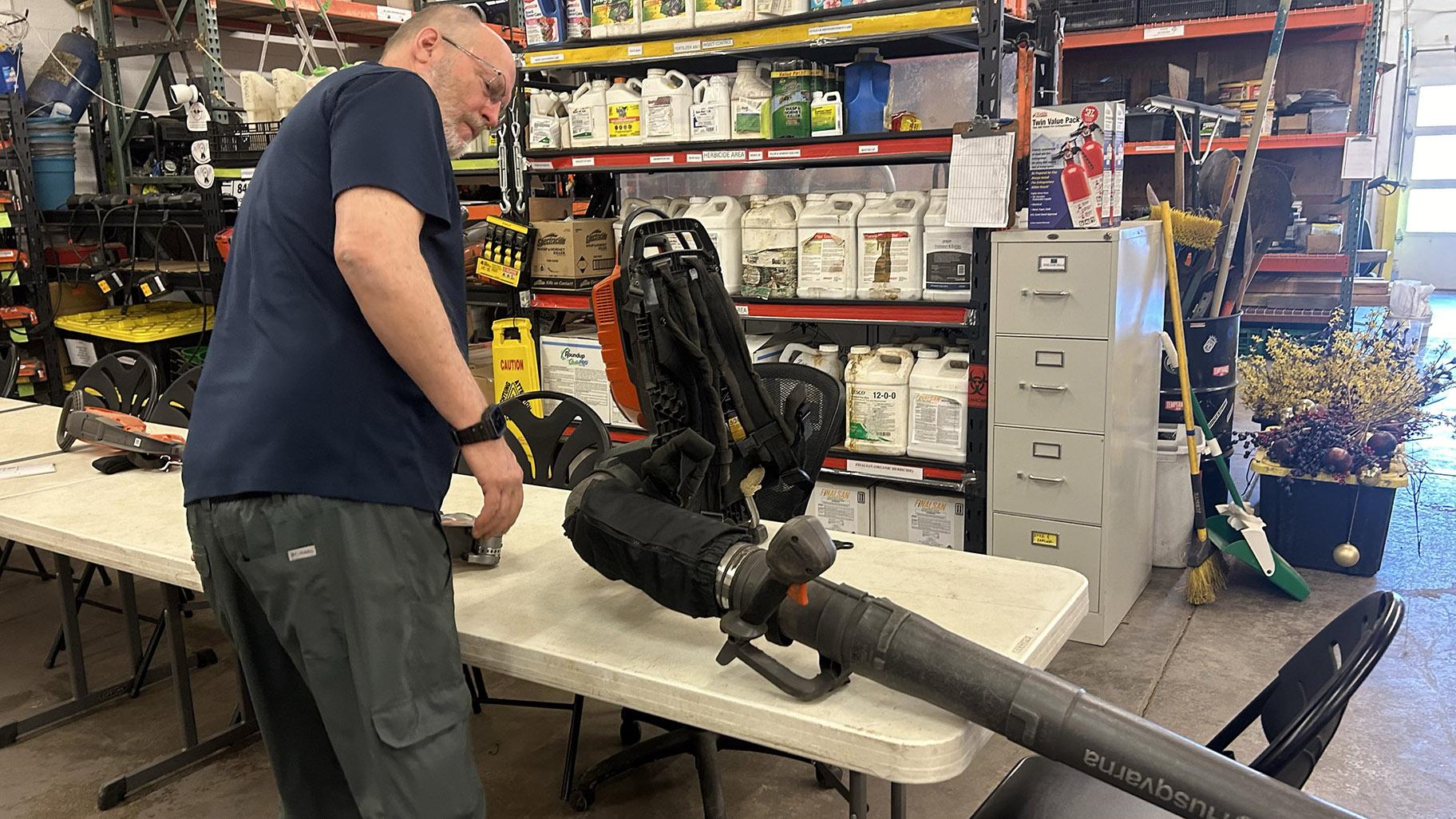 Tom Klitzkie demonstrates an electric leaf blower at Nature’s Perspective Landscaping, his Evanston-based landscaping company. (Blair Paddock / WTTW News)
Tom Klitzkie demonstrates an electric leaf blower at Nature’s Perspective Landscaping, his Evanston-based landscaping company. (Blair Paddock / WTTW News)
One Landscapers’ Influence
Stately purple allium puffballs and a manicured garden greet visitors outside of Nature’s Perspective Landscaping.
The company, appropriately on Evanston’s Greenleaf Street, has evolved since Tom Klitzkie ran it out of his basement some 45 years ago.
He’s eager to show off that the company recently won the Professionals’ Choice Award from the Illinois Landscape Contractors Association for an Evanston lakefront estate maintained with all electrics, which, he said, really impressed the judges. The award sign is next to a wall of even more accolades for excellence in landscaping.
The company has tried to be “ahead of the curve” adapting to the ban, said his son Paul Klitzkie, who’s also the general manager of the company. They dropped about $75,000 on upgrading to about 30 electric blowers and batteries.
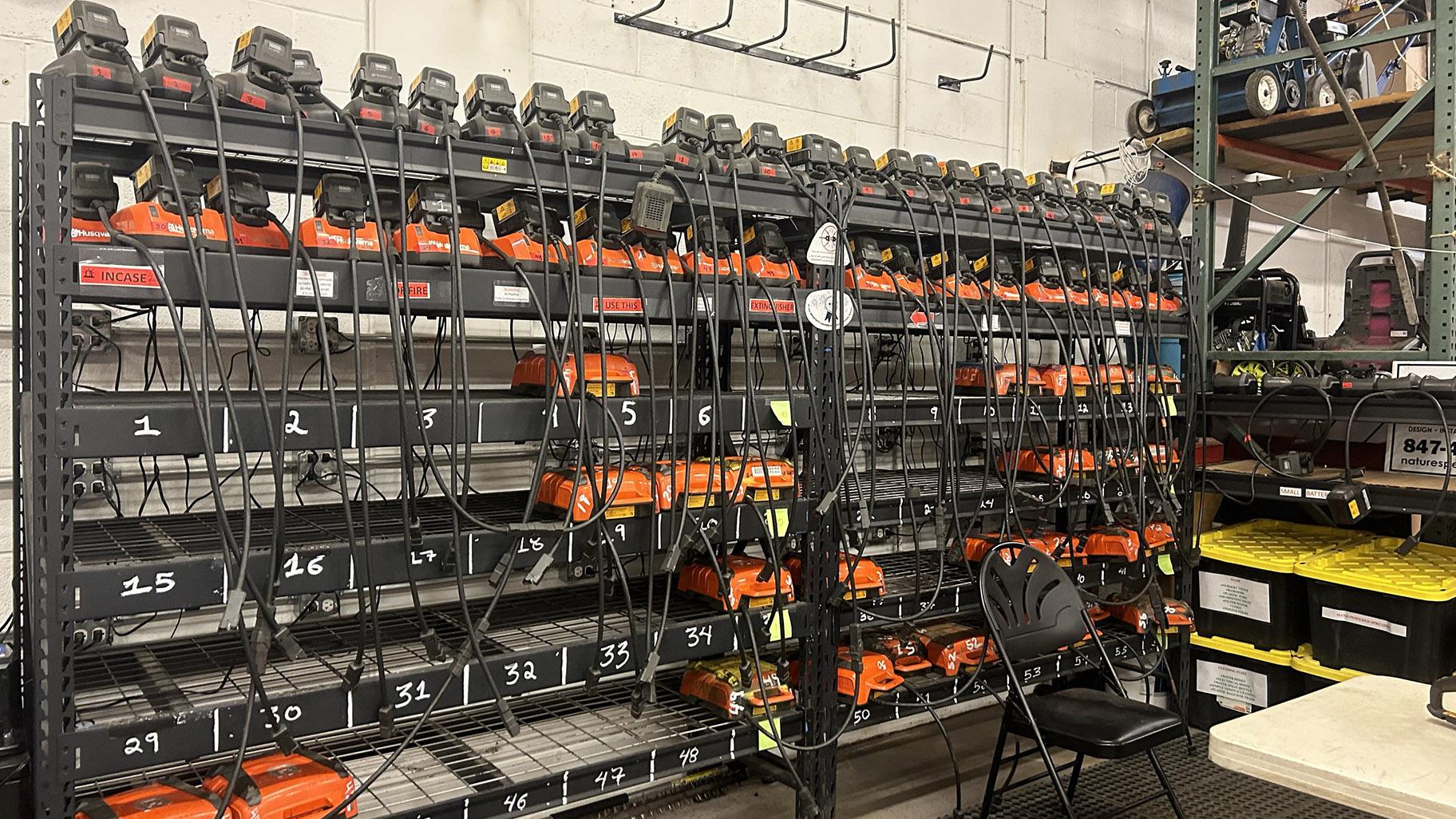 Racks of electric leaf blower chargers are pictured at Nature’s Perspective Landscaping in Evanston. (Blair Paddock / WTTW News)
Racks of electric leaf blower chargers are pictured at Nature’s Perspective Landscaping in Evanston. (Blair Paddock / WTTW News)
Tom Klitzkie served on the city’s Environmental Board providing input on the ban. He said he abstained from votes around advancing the measure to City Council; however, he wrote a memo to the council outlining a need for compliance assistance and enforcement protocols, among other topics, to be considered for the ordinance, according to a WTTW News review of city email records.
Klitzke did abstain from the vote advancing that memo to the City Council.
When asked if it might seem like a conflict of interest, he said that he was invited to be on the board because of his prior work with the city’s Ladd Arboretum.
“I demonstrated the machine to them, brought it into the City Hall and showed them what the difference was and they were impressed to advance it,” he said.
But some constituents took issue with his position on the board.
In May 2021, Tom Klitzkie’s son, Ben Klitzkie, sent an email to City Council members about leaf blower bans.
At first, the Klitzkies were hesitant of the ban, warning “fellow contractors” of “potential hardships” of a ban.
“We started really kind of involving ourselves with different City Council meetings and tried our best to talk with the City Council and say that, and again, battery technology still really wasn’t there at that point in time …,” Paul Klitzkie said. “And we said, you know, please give it time, please let us, you know, tell you that these are important tools. And the City Council really did not listen to us at all, unfortunately.”
A constituent then forwarded that email to Biss, writing that she was “concerned that Tom Klitzkie is sitting on the environment board while his family and company quietly rolls out this disinformation lobbying campaign against an ordinance … .”
“Isn’t this a conflict of interest?” she continued.
The mayoral-appointed board is unpaid and advisory, but “brought proposed changes to strengthen Evanston’s approach to the regulation of leaf blowing equipment to City staff for consideration,” according to a memorandum of the ordinance.
Biss responded, writing “personally, I agree that it’s not appropriate for someone to sit on the Environmental Board and also own a company that’s regulated by the City in an area that the Environmental Board has jurisdiction over.”
When WTTW News asked this May about the 2021 email exchange, Biss said the city doesn’t remove people from boards except for reasons like nonattendance. Klitzkie was already on the board when Biss took office in 2021.
“It’s not the case that we want to be aggressively punitive or go after people as though they’re violating some sort of ethical standard,” Biss said. “It’s just a question of how do we as a city do the best possible job to create the separation that maximizes the confidence that people have and the decisions these boards and committees and commissions make, and that’s just a constant tension.”
Another constituent raised a concern about the letter Ben Klitzkie sent out, emailing Ald. Eleanor Revelle (7th Ward) in June 2021 that “this letter from Ben Klitzkie is a clear conflict of interest for Tom Klitzkie. Tom Klitzkie is the owner of Nature’s Perspective and a member of the Evanston Environmental Board. I understand that he is also a member of the committee considering changes to the current leaf blower ban. … Question for you. What’s the difference between Tom or Ben sending this email? In my opinion, none.”
Revelle defended having Tom Klitzkie on the board, writing that his role is “advisory–as is the role of all of the board members. The board is well aware that Mr. Klitzkie has a vested interest in the leaf blower issue but his viewpoint as a stakeholder is important to the discussion.”
Tom Klitzkie resigned from the board in 2023. He said it was “time to stop.”
Klitzkie and his sons, Ben and Paul, were eager to make their voices heard to council members over the legislation.
“We had a lot of suggestions,” said Paul Klitzkie.
The family felt tasked to provide the landscaping business perspective to the City Council since their industry, they said, was being targeted by the ban.
“It seemed like they have made these blowers out to be, like, the worst thing ever made in the entire planet,” Paul Klitzkie said. “And it was like thinking somebody had, like, a nuclear bomb, you know, strapped to their back. And it’s like, well, wait a second, everybody drives cars around here. They’re not all electric.”
Leaf blowers are integral to landscaping jobs because of their efficiency, Paul Klitzkie said. During the peak spring and fall seasons, it takes too much time, and in turn, too much money, for customers to clean up mounds of wet, frozen leaves with rakes and brooms.
Emails obtained by WTTW News reflect the family’s efforts to provide input to council members.
In March 2023, Ben Klitzkie, who’s also the director of maintenance for Nature’s Perspective, wrote to city officials sharing “specific areas of the ordinance that need attention,” including a suggested change to match the operation hours for electric blowers and the hours allowed for construction, which are less restrictive, writing “the electric blower is now one of the quietest tools.”
Ald. Bobby Burns (5th Ward) responded that he’d be “happy to co-refer” this for further consideration. Ald. Clare Kelly (1st Ward) thanked Ben Klitzkie for “writing and providing these very helpful and excellent suggestions for improving the leaf blower ordinance.”
Then, Ben Klitzkie’s suggestions to amend the ban were introduced in the next Human Services Committee meeting in May 2023.
Revelle, who is included on the email thread, requested to amend the ordinance to match leaf blower operation hours to those of construction. “The Ordinance does not credibly or equitably align with the hours allowed for construction companies despite electric leaf blowers being quieter than most construction tools,” states the memorandum.
The amendment was passed that month.
In January 2024, Tom Klitzkie sent an email to Evanston Health and Human Services staff, as well as City Council members, detailing the hundreds of gas leaf blower violations he and a colleague documented, attaching a meticulously kept list of dates, times, addresses and the companies he alleged were not complying.
He included recommended changes to the leaf blower ordinance: improving enforcement of the requirement that contractors register with the city as well as “drastically raising the fines for each violation.”
During the next Human Services Committee meeting in February 2024, these two ideas are included in the staff recommendations to improve the program: “creating a system that enrolls landscapers as registered contractors will tremendously help with enforcement” and “staff is recommending an increase in fines to prevent repeat violators.”
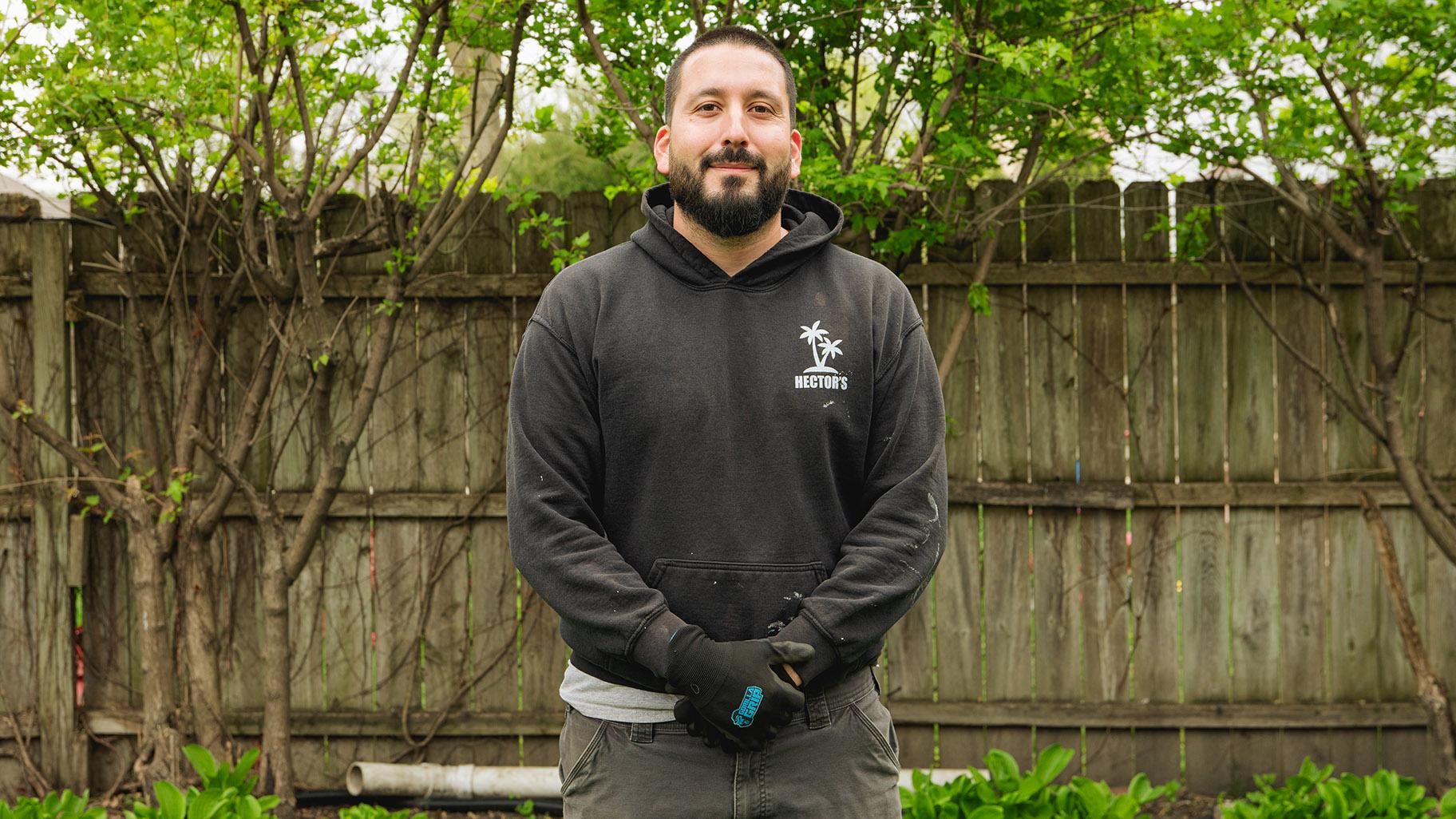 Landscaper Hector Hernandez is pictured on April 23, 2024, in Evanston. (Michael Izquierdo / WTTW News)
Landscaper Hector Hernandez is pictured on April 23, 2024, in Evanston. (Michael Izquierdo / WTTW News)
Grant Restrictions Cause Concern
Landscaping offers hands-on work for Hector Hernandez. It’s ideal for him, as he didn’t take much interest in school and said books weren’t for him. He’s served the north suburbs for about 16 years.
“I do love what I do,” Hernandez said.
His company, Hector’s Landscaping & Tree Services, has since expanded, now offering concrete, drainage, and tree service, in addition to landscaping. But even with multiple revenue streams, the cost of the switch to fully electric equipment is steep.
Earlier this year, he said, he splurged on the electric blower setup for his team, with a price tag of $24,144.67. That includes three backpack blowers totaling $1,799.97, four batteries totaling $5,599.96 and a single battery charger for $14,500, plus tax.
Evanston has tried to assist landscapers. In 2024, the city allocated $600,000 to businesses going green, with over half of those being landscaping companies. There was an additional $180,000 from the City Council, which approved the purchase of electric leaf blower equipment in bulk for landscapers.
But the grant money is now depleted, according to city officials.
Some landscapers said the process to apply was cumbersome.
 Evanston Ald. Juan Geracaris (9th Ward) saysEvanston Ald. Juan Geracaris (9th Ward) says the gas-powered leaf blower ban ended up being a financial and logistical burden when first implemented. (Michael Izquierdo / WTTW News) the gas-powered leaf blower ban ended up wing a financial and logistical burden when first implemented. (Michael Izquierdo / WTTW News)
Evanston Ald. Juan Geracaris (9th Ward) saysEvanston Ald. Juan Geracaris (9th Ward) says the gas-powered leaf blower ban ended up being a financial and logistical burden when first implemented. (Michael Izquierdo / WTTW News) the gas-powered leaf blower ban ended up wing a financial and logistical burden when first implemented. (Michael Izquierdo / WTTW News)
Ald. Juan Geracaris (9th Ward) attributes that in part to the city’s messaging and education around applying for the grants. The application process has changed over the past several months, making it difficult for some to keep up with who’s eligible.
Last summer, the number of businesses that had taken advantage of the grants was alarmingly low, said Geracaris. He said that was due to many of the smaller landscaping companies not being able to qualify for the grants. For example, landscapers registering with the city for the first time were not eligible. However, that requirement is now waived. And at first, Spanish versions of the application were not available.
While there may be a will to comply, landscapers said electric blower technology is “just not there yet.”
The battery on the blower won’t last a full day of work and is drained after about an hour and a half, said landscaper Juan Rodriguez.
“We agree that the environment is an issue and we’re here to comply, but the way that they’re trying to put this on us is very injust,” Rodriguez said.
Recharging a dead battery can take several hours, according to Rafael Villanueva with Touch of Life Lawn Care.
Villanueva said that the short battery life and lengthy recharge time force him to have to plug in batteries at clients’ homes, which makes people “really, really mad.” So oftentimes he’s charging at his own home, and is nervous about a big bump in his electric bill.
“My wife keeps telling me the bill’s gonna be really, really high,” he said.
All this slows down the job, Villanueva said, so he, like other landscapers, has had to increase his prices. He said he and his crew now take about two hours to finish a job that took them about an hour with a gas blower.
Then a familiar story to local landscapers plays out: Clients are lost due to higher prices.
“I had almost 15, 16 clients who quit on me,” Villanueva said. “Nobody comes back to you because they expect to have the same price.”
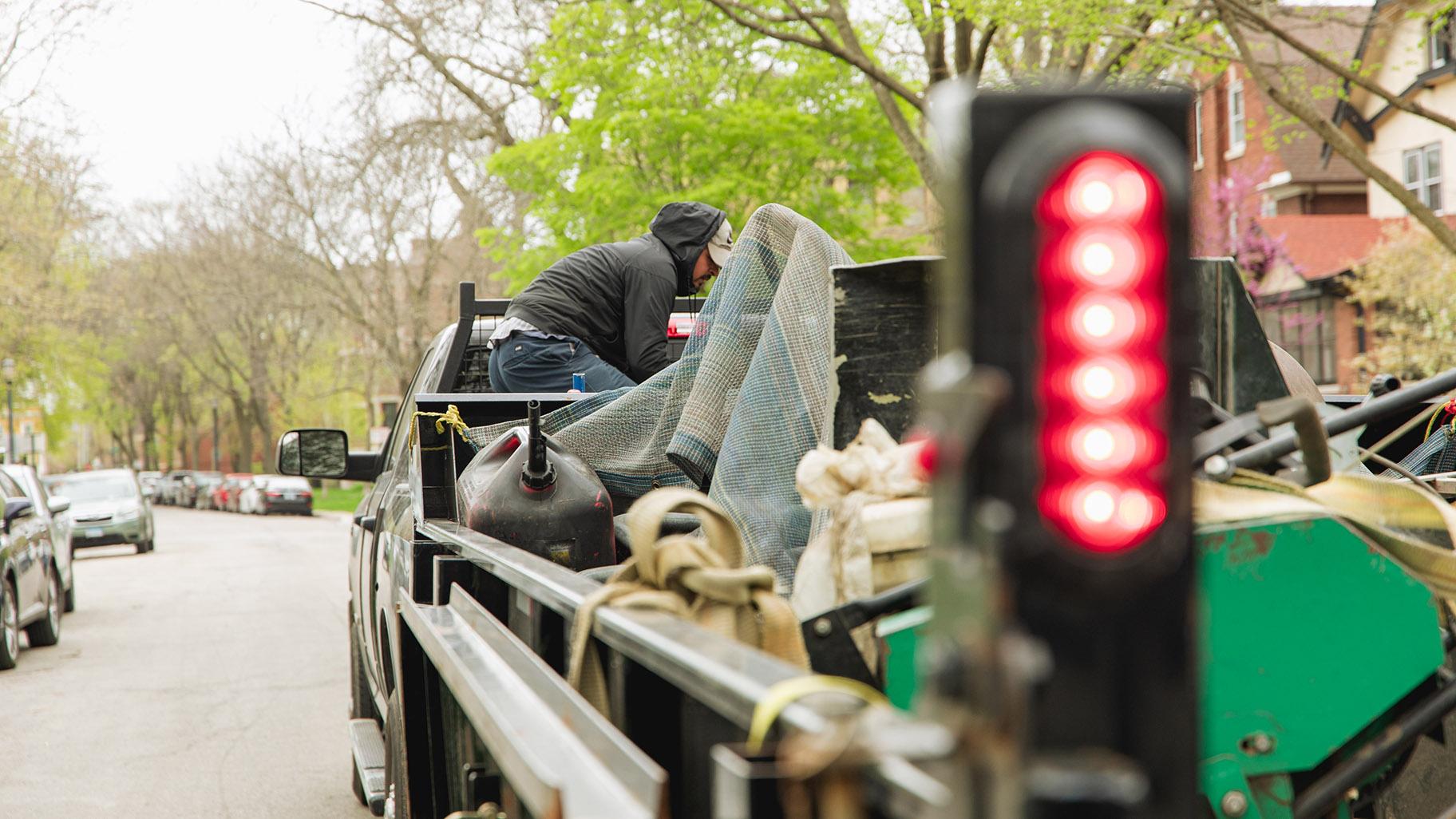 Rafael Villanueva’s landscaping crew prepares to work on an Evanston lawn on April 23, 2024. (Michael Izquierdo / WTTW News)
Rafael Villanueva’s landscaping crew prepares to work on an Evanston lawn on April 23, 2024. (Michael Izquierdo / WTTW News)
Landscaper as Main Enforcer
A white truck lurked around Evanston.
With an arm stuck out and phone in hand, the driver would take a photo or video of landscapers working, maybe to catch them breaking the ban and using a gas blower.
It’s Tom Klitzkie behind the wheel.
“He’ll park like a block away and he’ll just sit there,” Rodriguez said.
“He’s driving around, making circles around the area, hunting everybody, driving and recording … ,” Hernandez said. “Hunting down your fellow workers is just a little excessive, don’t you think?”
Tom Klitzkie said he saw it as “something worth doing,” and that it was on the city for creating this procedure to report. To report a violation, witnesses contact the city’s 311 line and provide a signed witness statement.
“I didn’t make the mechanism how to do this,” Tom Klitzkie said. “My interest was not to penalize, it was just to bring everyone to the table.”
At first, reporting a violation required the submission of a video or photo. That’s no longer a requirement, but if visuals are included in a complaint, that “will aid to strengthen enforcement,” according to Evanston’s leaf blower page. The city also asks those making a report to “not be confrontational with a landscaper violating the ordinance.”
“I did feel it was important to go around and find out who these people were, and see if I can identify them and if I can cajole them, talk to them and approach them,” Tom Klitzkie said.
Since the beginning of the ban in April 2023, he’s submitted 283 complaints to the city’s 311 system over the ban. He said he still sees people breaking the ban, but hasn’t made any complaints this year, and said he’s “satisfied” himself.
“I did see four of them so far this year. I’ve not looked too hard. I’ve not pursued. I’ve not followed,” Tom Klitzkie said. “I’m willing to just let it be, because I’ve gone far enough, I’ve done enough.”
Landscapers have said enforcement and reporting of the ban has fallen on neighbors, “deputizing people” and leading to sometimes tense interactions, according to Hernandez.
“I feel like a criminal,” Rodriguez said. “... We’re being called names and being looked at as bad people.”
“People driving around or neighbors walking their dog or something, they’ll just come and scream at you, like you’re not allowed to use the blower here in Evanston so shut it off or I’m gonna call the police,” said landscaper Jose Perez, with Jose Landscaping.
“This is allowing racists to stand up and kind of empowering them to do something towards Latinos and Hispanics,” Hernandez said. “This is going to mess with the way we work and the way we think of Evanston.”
Geracaris acknowledged the ban has led to negative interactions between landscapers and residents.
“I wish that could have been avoided …,” Geracaris said. “I think we didn’t really realize how big of a burden it was financially and also logistically for them to make that conversion.”
If complaints are found credible, landscapers can be hit with fines. The first offense comes with a written warning, the second is a $100 fine, the third is $150, the fourth is $200 and the fifth or more is $250.
A fine can greatly diminish a day’s earnings. Perez charges $120 to $240 per yard, depending on the size of the property. Last year, he was hit with fines totaling $300 for violating the ban.
“If we get a ticket on a house where we charge you $120, you just earn $20,” Perez said.
Since April 2023, Evanston has solicited $10,600 in fines, with $8,750 of that paid off as of May 17, according to city officials.
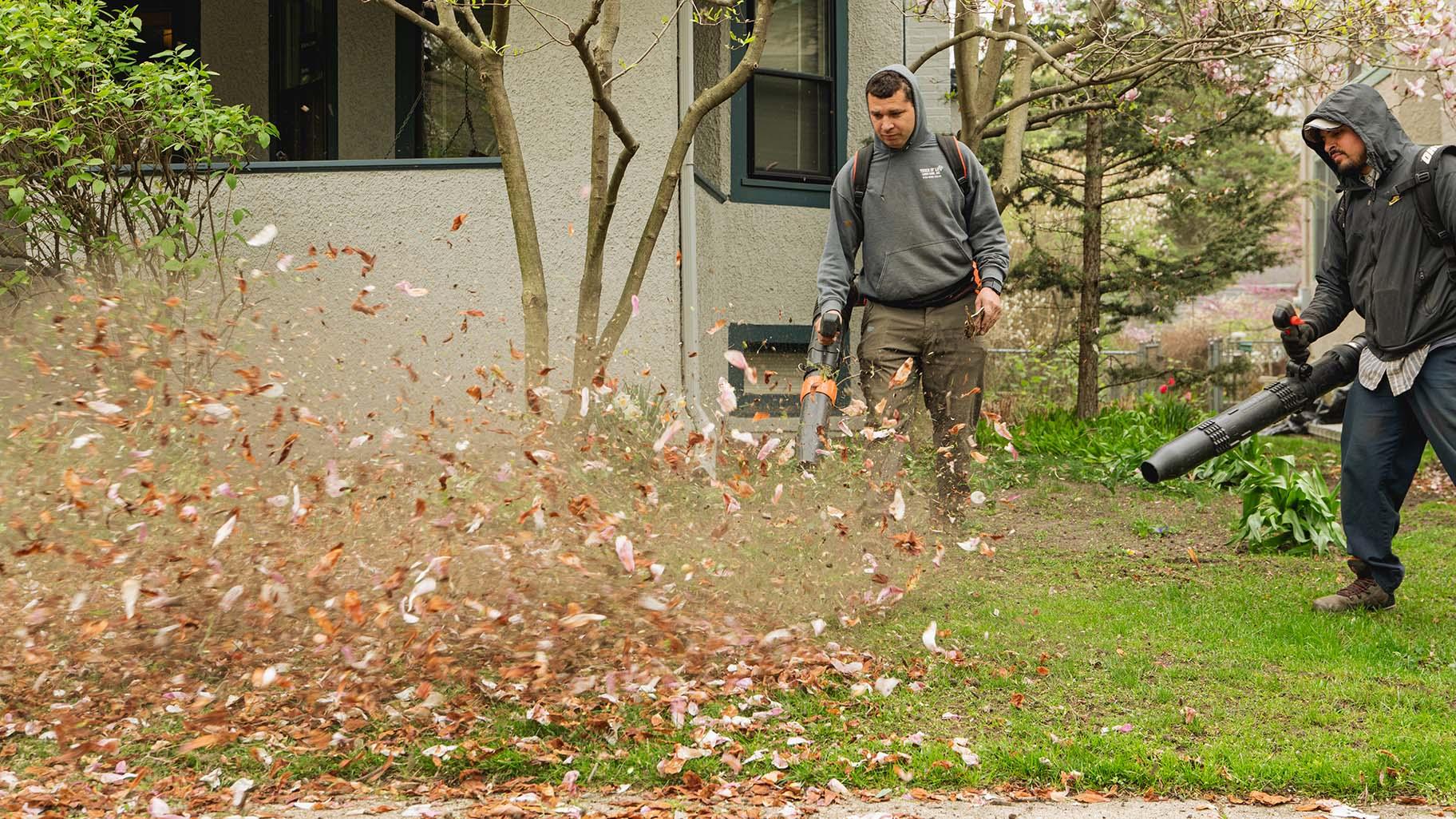 Rafael Villanueva, left, works on an Evanston lawn on April 23, 2024. (Michael Izquierdo / WTTW News)
Rafael Villanueva, left, works on an Evanston lawn on April 23, 2024. (Michael Izquierdo / WTTW News)
An Uncertain Future
Rafael Villanueva slung the heavy electric blower on his back, beginning his work day in Evanston.
He’s engulfed by swirling clouds of dirt and magnolia petals as the blower starts up.
As costs rise and clientele leave, he said he has lost enough money to force him to consider leaving the business.
Surrounding suburbs like Glencoe, Wilmette and Winnetka are restricting gas-powered leaf blowers to certain weeks.
The Gas-Powered Leaf Blower Ban Act was introduced in February to the Illinois House of Representatives. It would prohibit the operation and sale of gas-powered blowers statewide.
Villanueva is concerned the trend of losing clientele might continue due to new bans.
His brother-in-law drives an 18-wheeler and Villanueva sees a possible future in that. Truck driving is good money, he added.
But he’d miss working outdoors, his job for more than 20 years.
“I love it, it’s my passion here,” Villanueva said. “But if I don’t get work, there’s no other way to take another road.”

